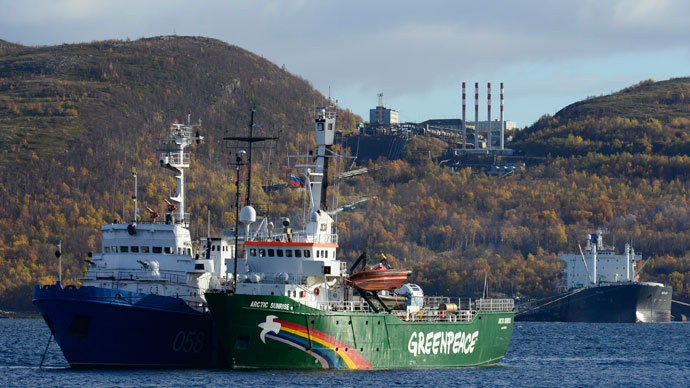All 30 Greenpeace activists involved in an Arctic oil rig protest have been charged with piracy, which could mean 15 years in prison. The environmental group called the decision “absurd,” but Gazprom insists the protest could have had tragic consequences.
Among those charged are two freelance journalists from Britain
and Russia who were making video recordings and taking
photographs on Greenpeace’s Arctic Sunrise vessel.
The Investigative Committee said Thursday that all the crew
members deny their guilt and are currently refusing to testify.
"Our activists have been charged with a crime that did not
happen, they are accused of an imaginary offence," Greenpeace
International Executive Director Kumi Naidoo said.
Russian authorities accuse the activists of trying to commandeer
the oil platform, although Greenpeace says the protest was simply
a campaign against the environmental risks posed by increased
energy exploitation in the Arctic. They insist that an oil spill
would be highly damaging to the environment and that the
extraction of more fossil fuels would add to climate change.
However, Gazprom - the owner of the Prirazlomnaya oil rig -
claims that “today the platform has no negative impact on the
environment, which is confirmed by official documents.”
"It is difficult to say anything. Probably the word ‘absurd’
suits it the best. We are astonished," Greenpeace Russia
program director Ivan Blokov told Interfax.
Russian veteran rights activist Lyudmila Alekseeva, head of the
Moscow Helsinki Group, said she is disappointed with the charges,
calling the move “repressions and medieval.”

“I would let them go. I would take down their banner, look at
it and let them go with their banner. What have they done?”
Alekseeva told Interfax.
Alekseeva warned the Greenpeace trial may provoke spark global
protests, just like the Pussy Riot case and the gay propaganda
law.
However, Gazprom maintains that the activists’ actions on
September 18 are “absolutely inadmissible” and could have
led to unpredictable and even tragic consequences for divers who
were working underwater.
“Their work was interrupted in the emergency order. No one
imagined that people on high-speed inflatable boats would start
moving to the platform,” Gennady Lyubin, executive director
of Gazprom Neft Shelf, said in his first comment since the
incident.
According to Gazprom, Greenpeace did not notify the rig’s
authorities that they were planning the protest.
“That Greenpeace arrived, we learned when the vessel appeared
on the radar of our platform,” Lyubin told PRIME news agency.
Lyubin says Greenpeace activists failed to scale the platform,
but based on previous Greenpeace actions around the world,
Gazprom assumed protesters would try to climb on the oil rig
itself.
“The aim of such actions could be a desire to get into an
object and destabilize its work for a while,” Lyubin
suggested. “In our case they tried to reach the helipad. In
case of success, it would [have prevented] us for an indefinite
time from using it. In short, we are all lucky to not have had
tragic consequences.”
He declined to comment on whether the activists’ actions caused
any material damage, saying that when people’s lives are
threatened, such questions are pushed to the back burner.
Earlier, Russian investigators also stated that the activists’
actions “posed a real threat” to employees on the rig.
Despite the incident, Gazprom says it is ready to have a dialogue
with the Greenpeace activists, but only if it is “constructive
dialogue,” where both sides are listening to each other.
So far, there has not been a dialogue, “but an attempt to
impose their views,” Gazprom said.
“They call the oil spill response plan insolvent, and
say the platform does not provide a safe mode of field
development. On any statement they say: ‘This is not good, this
is bad, this is wrong, all you are doing is wrong,’” Lyubin
said.
Greenpeace will now appeal the court’s decision.
"Representatives from all the countries from which members of
the Arctic Sunrise crew came will be involved in this,"
Blokov said.

